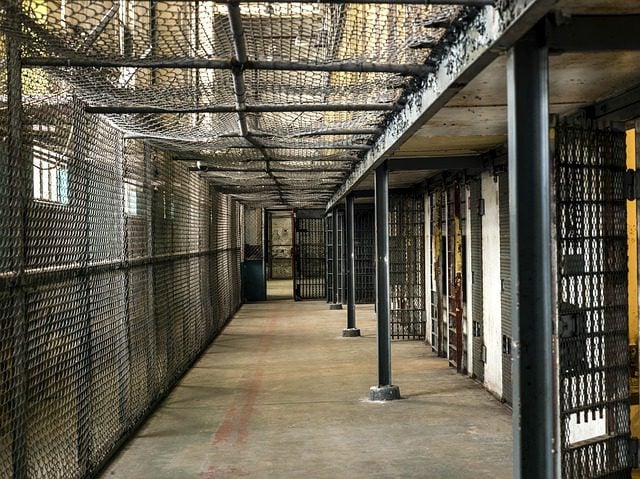
Last night, the United States committed another federal execution.
Orlando Hall, a rapist and murderer, was put to death by lethal injection. This happened after a stay of execution was overturned by the United States Supreme Court. One of the justices who voted to overturn the stay was the newest supreme court justice, a Charismatic Catholic and darling of the pro-life movement, Amy Coney Barrett. Of course she’s not the only Catholic on the Supreme Court; Justice Kavanaugh ruled to kill Hall as well. And Attorney General Barr, a Catholic, is the one who resumed federal executions in the first place.
When a Catholic commits a scandalous act in public like this, it’s necessary to remind everyone of what Catholics actually profess. The Catholic Church teaches that the death penalty is wrong. The death penalty is wrong for the same reason abortion is wrong: because it’s wrong to kill people. Full stop. You’re not supposed to kill people.
Yes, this is a teaching of the Church that has been defied at countless times in history, including by devout Catholics who thought they were glorifying God by killing– and I mean by clerics, the hierarchy and even by some saints. The saints were mistaken. It remains Church teaching anyway. What’s wrong is wrong, even when ostensibly good Catholics do it. Killing people is wrong, not because the people being killed are innocent or because they’re cute or because they have the potential to do good, but simply because they are people. Human life is sacred and it’s a grave sin to end it, whether the human is a saint or a monster. That’s the rule.
There are some circumstances where it’s permissible to react to a deadly threat with proportionate force in order to protect yourself and others. The catechism says:
Love toward oneself remains a fundamental principle of morality. Therefore it is legitimate to insist on respect for one’s own right to life. Someone who defends his life is not guilty of murder even if he is forced to deal his aggressor a lethal blow: If a man in self-defense uses more than necessary violence, it will be unlawful: whereas if he repels force with moderation, his defense will be lawful. . . . Nor is it necessary for salvation that a man omit the act of moderate self-defense to avoid killing the other man, since one is bound to take more care of one’s own life than of another’s.
We’re allowed to react with deadly force to protect ourselves and others from a deadly threat. But it has to be the minimum necessary force, and when the threat is neutralized, the violence has to stop. If a pirate wielding two pistols with a cutlass in his teeth climbs into my bedroom window to murder me, I am allowed to push him back out the window to defend myself. I don’t sin by pushing him back out. I don’t sin even if he dies from the fall. But if I run out on the lawn and find that the pirate is still alive but incapacitated with his pistols out of reach, and I pick up the pistol and finish him off, I commit a grave sin. I also sin if I don’t run inside and call him an ambulance. I defended myself from a deadly threat, but during and after that act of defense, the pirate remained human. And it’s a sin to act to kill a human, even if that human is a bloodthirsty pirate. It doesn’t matter who the human is. It matters that they’re human.
This principle can be applied to situations like war as well. The Catechism says:
The fifth commandment forbids the intentional destruction of human life. Because of the evils and injustices that accompany all war, the Church insistently urges everyone to prayer and to action so that the divine Goodness may free us from the ancient bondage of war.All citizens and all governments are obliged to work for the avoidance of war. However, “as long as the danger of war persists and there is no international authority with the necessary competence and power, governments cannot be denied the right of lawful self-defense, once all peace efforts have failed.”
The strict conditions for legitimate defense by military force require rigorous consideration. The gravity of such a decision makes it subject to rigorous conditions of moral legitimacy. At one and the same time:
– the damage inflicted by the aggressor on the nation or community of nations must be lasting, grave, and certain;
– all other means of putting an end to it must have been shown to be impractical or ineffective;
– there must be serious prospects of success;
– the use of arms must not produce evils and disorders graver than the evil to be eliminated. The power of modem means of destruction weighs very heavily in evaluating this condition.
These are the traditional elements enumerated in what is called the “just war” doctrine.
If my neighbors and I in LaBelle learned that an angry militia from the next neighborhood over was coming with guns to massacre us and couldn’t be persuaded to go home and leave us alone, we could get out our own guns and have a battle to fight them off. That’s not a sin. We’d be in danger of lasting, grave, and certain damage. We couldn’t figure out a way to stop the battle without fighting in it. We’re not creating a greater evil than what would’ve happened if we’d let them slaughter us. And we would probably win, because LaBelle has more guns than Fort Knox.
But if the militia surrendered and we decided to shoot them to teach them a lesson, or if we didn’t go out after the battle and take the wounded to the hospital, or if we decided to nuke their neighborhood to prevent them from doing this again– that would be grave sin. Because killing people is wrong.
At some points in history, it was not always wrong to apply the death penalty, but that time has come and gone. The Catechism says:
Assuming that the guilty party’s identity and responsibility have been fully determined, the traditional teaching of the Church does not exclude recourse to the death penalty, if this is the only possible way of effectively defending human lives against the unjust aggressor.
If, however, non-lethal means are sufficient to defend and protect people’s safety from the aggressor, authority will limit itself to such means, as these are more in keeping with the concrete conditions of the common good and more in conformity to the dignity of the human person.
Today, in fact, as a consequence of the possibilities which the state has for effectively preventing crime, by rendering one who has committed an offense incapable of doing harm – without definitely taking away from him the possibility of redeeming himself – the cases in which the execution of the offender is an absolute necessity are very rare, if not practically nonexistent.
The only time it would not be a sin to execute a prisoner, would be if that was the absolute only way to protect people from that prisoner killing again. If you and I were cowboys living in the Wild West, and we were absolutely certain the evil highwayman was certainly going to escape from the tiny jail cell at the sheriff’s office in Dirty Gulch and murder people again, it wouldn’t be wrong for the sheriff to go ahead and execute the highwayman. But in modern times, with the existence of maximum-security prisons, that condition doesn’t exist anymore. It’s possible to lock people away for life. If it’s possible to do that, that means the death penalty is not necessary anymore, and that means executing someone is a grave sin. The death penalty would only be morally permissible if it was used to protect others, and not for any other reason. Not to punish a bad person. Not to deter future bad people from doing what the bad person did. Not to give the murderer’s victim’s family “closure.” Because it’s wrong to kill people.
Orlando Hall was a bad person. He was a cold-blooded killer who kidnapped and raped a teenage girl before burying her alive. If there was a textbook example of a person who might deserve to be killed in vengeance, it would be Orlando Hall. But Orlando Hall was a human being, and that means that we as Catholics are required to respect and safeguard his life. Because human life is sacred and taking it is wrong.
Last night, Orlando Hall was himself the victim of killing. He was strapped to a gurney and injected with a drug cocktail that suffocated him, just as his victim suffocated to death in 1994. This was done even though he was not a danger to anyone anymore. Not only was he locked up in a modern-day prison where he couldn’t escape, but he’d spent the past few decades repenting of the murder and was no longer a violent man. His execution was a grave sin and injustice committed against Heaven and against him, just as the murder he committed was a grave sin and injustice committed against Heaven and against Lisa Rene.
He was killed because the Supreme Court overturned his stay of execution, and because federal executions were resumed. These were grave sins on the part of public Catholics we’re all supposed to believe are pro-life.
What happened last night to Orlando Hall was deeply unjust. May God have mercy on his soul, and on all of us.
Image via Pixabay.
Mary Pezzulo is the author of Meditations on the Way of the Cross.
Steel Magnificat operates almost entirely on tips. To tip the author, visit our donate page.











